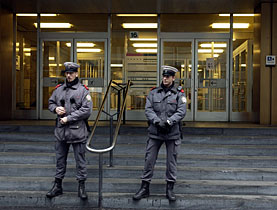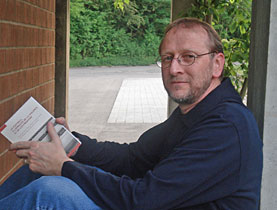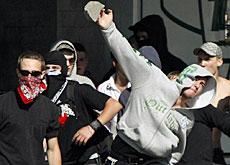“Jihadism” is biggest threat to Swiss security

Terrorist attacks by Islamic extremists pose the greatest threat to Switzerland's internal security.
The Federal Police said on Friday that the threat was real even though it had no evidence of any attacks being planned in recent years.
The director of the Federal Police office, Jean-Luc Vez, said in the introduction to the internal security report for 2007 that “western Europe is a hotbed of jihadism and Switzerland is located in the centre of this danger zone”.
“In western Europe, particularly in Britain, Denmark, Germany, France and Spain, security forces uncovered operational cells whose members were chiefly residents of the respective countries,” the report explained.
“Moreover, it has become apparent that the network around core Al-Qaeda members in Pakistan maintains operational links to Europe.”
Last year, four alleged Islamists in Switzerland were either convicted or deported on charges of supporting a terrorist criminal organisation, making public calls to violence or violating laws on racism.
“It is not only jihadism which endangers [Switzerland’s] internal security,” Vez added. “Organised crime is also a threat, as is politically motivated violence.”
The report said criminal groups from the Commonwealth of Independent States continued to operate an extensive network in Switzerland.
Threat to financial centre
These groups, which use structures within the country to legalise and invest ill-gotten gains, “pose a threat to the economy, to democratic institutions and to Switzerland as a financial centre”.
The police added that criminal organisations from southeastern Europe also played a “significant role” in Switzerland. These internationally interlinked groups were involved in numerous criminal activities including drug and human trafficking, migrant smuggling and money laundering.
Victor Mauer, deputy director of the Centre for Security Studies at the Federal Institute of Technology in Zurich, said the report confirmed general trends in European security matters.
“There is no question that Islamic terrorism is the biggest threat. Despite the fact that they have not been able to locate any groups here in the country,” he told swissinfo.
He said he hoped to report would help the Swiss population come to terms with the fact that Switzerland was not a special case in Europe and belonged to a wider network of European countries threatened by jihadism.
“We can’t just simply say these days that it is all about national security. Really it is about global security issues.
“I think what seems to be fairly clear is that the country needs to, and it has done in recent years, cooperate really closely with its European neighbours and its transatlantic partners. That’s absolutely crucial, be it that you are neutral or not.”
Political violence
The number of leftwing motivated incidents fell by 2.6 per cent last year, but the police said leftwing extremism was still a threat to domestic security.
The report noted that the anti-globalisation movement had become less important for leftwing extremists but activities were intensified against the rightwing Swiss People’s Party – the largest party in the Swiss parliament.
Confrontations between leftwing and rightwing militants presented security forces throughout Europe – including Switzerland – with considerable problems. Worrying was the trend of rightwing groups to behave more aggressively towards the security forces.
Espionage remained a concern last year with Switzerland an attractive target since it is the home of many research institutions and high-tech companies, the police said.
Foreign intelligence services continued to engage in all kinds of activities in the country – but it was often international organisations and foreign states that were the target, not Switzerland itself.
Dissidents and cybercrime
The political activities of refugees and dissidents living in Switzerland were also kept under surveillance by foreign states.
Cybercrime nearly doubled last year with at least 900 cases reported each month. Top of the list were cases of child pornography followed by economic crime.
A section of the report is also devoted to football hooliganism. “Most of the matches in 2007 by teams in the top football league were characterised by violence among opposing fans, towards the police and sometimes even towards innocent bystanders,” it summarised.
The police estimate that there are up to 2,000 football fans willing to use violence in Switzerland, with 200-300 belonging to a well organised hard core.
swissinfo
Federal Police Office director Jean-Luc Vez told a media conference Switzerland lacked the tools to evaluate the security situation properly.
He said he regretted that parliament had yet to pass a bill to allow the authorities to use wiretaps and to monitor post, emails, computers and telephones to combat terrorism.
Vez said it was not possible for the Federal Police to fill the information gaps solely with reports from foreign intelligence-gathering services.
A report issued on Friday outlining the work of the Federal Police in 2007 gave the following facts and figures:
The Federal Police have a budget of SFr233 million.
They have 988 employees working with 47 different information systems.
More than 2,500 instances connected with international terrorism were handled in 2007.
They had to deal with 171 threats, which was more than half as much again as in 2006.

In compliance with the JTI standards
More: SWI swissinfo.ch certified by the Journalism Trust Initiative


You can find an overview of ongoing debates with our journalists here. Please join us!
If you want to start a conversation about a topic raised in this article or want to report factual errors, email us at english@swissinfo.ch.